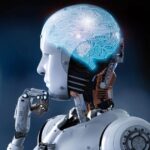The role of Artificial Intelligence (AI) is expanding across industries, making systems smarter and more efficient. However, with this rise, there comes a need for ensuring the reliability of these AI systems.
AI testing plays a crucial role in this regard, improving the trustworthiness of AI models by ensuring they perform as expected. In this article, we will explore how AI testing improves reliability, the methods used, and the importance of consistent testing.
What is AI Testing?
The AI testing is a process of evaluating and verifying AI models to ensure they deliver accurate and reliable results. It involves running a series of tests to check how well the AI algorithms function and identify any possible errors or biases.
It is not just about finding mistakes but also about understanding the behavior of AI systems. The testing ensures that AI models are robust and can perform tasks efficiently under different conditions.
Why is Reliability Important in AI?
The reliability in AI means that the system consistently provides accurate results without unexpected errors. In many sectors, such as healthcare, finance, and automotive, the reliability of AI can make a huge difference.
The AI systems that are not reliable can cause significant issues, including financial losses and safety risks. Therefore, making sure that these systems are reliable is a top priority.
- Ensures accurate and consistent results
- Minimizes risks and errors
- Increases trust in AI applications
The Role Of AI Testing in Enhancing Reliability
The AI testing helps in enhancing the reliability of AI models by identifying flaws and areas that need improvement. It involves testing the AI system under various conditions to see how it behaves.
It ensures that the AI model can handle real-world scenarios without failing. The testing also helps in reducing biases, which is crucial for systems that make decisions based on data.
Methods Used in AI Testing
There are different methods used in AI testing, each serving a specific purpose. Some of the most common methods include:
- Unit Testing: This tests individual components of an AI system to ensure each part works correctly.
- Integration Testing: This checks how different parts of the AI system work together.
- Performance Testing: This evaluates the speed and efficiency of the AI system.
- Stress Testing: This tests the AI system under extreme conditions to see how it handles pressure.
How Does AI Testing Identify Errors?

The AI testing frameworks use a variety of techniques to identify errors. It may include comparing the output of the AI model with expected results. If there is a significant difference, it indicates a problem.
The testing can also reveal issues related to data quality, which is a common problem in AI systems. By fixing these errors, developers can improve the reliability of their AI models.
The Importance Of Data in AI Testing
The data is a crucial element in AI systems. It is what the AI models learn from and what they use to make predictions. Therefore, having accurate data is essential for reliable AI models.
The AI testing helps in verifying that the data used by the AI model is correct. It ensures that the AI system can handle various types of data without producing errors.
Benefits Of AI Testing in Improving Reliability
The benefits of AI testing in improving reliability are numerous. It helps in creating AI models that are trustworthy and can be used in critical applications.
The testing also helps in reducing the time and cost of development by identifying issues early. This allows developers to fix problems before the AI system is deployed.
- Improves trust in AI systems
- Reduces development time and cost
- Ensures compliance with industry standards
Challenges in AI Testing For Reliability
The AI testing is not without challenges. One major challenge is the complexity of AI algorithms. It can be difficult to predict how an AI system will behave under different conditions.
Another challenge is dealing with biased data. If the data used to train the AI model is biased, the results will also be biased. The testing must address these issues to improve the reliability of AI systems.
How AI Testing Reduces Bias
Bias in AI systems can lead to unfair outcomes. For example, an AI model used in recruitment might favor certain candidates over others based on biased data.
The AI testing helps in identifying such biases and allows developers to correct them. It ensures that the AI system is fair and provides equal opportunities for everyone.
The Impact Of AI Testing On Different Industries
The AI testing improves reliability in various industries. In healthcare, it ensures that AI models can diagnose conditions accurately. In finance, it helps in preventing fraud by ensuring the AI system can detect suspicious activities.
The testing frameworks are also used in the automotive industry to ensure self-driving cars can navigate safely. Each of these applications relies on reliable AI models, which is why testing is so important.
Best Practices For AI Testing
To improve the reliability of AI systems, it is essential to follow some best practices in AI testing.
- Test Regularly: Regular testing helps in catching issues early.
- Use High-Quality Data: Always use accurate and unbiased data for testing.
- Monitor Performance: Continuously monitor the performance of your AI system to ensure it remains reliable.
Future Trends in AI Testing For Reliability
The future of AI testing is promising. New techniques are being developed to make the testing process more efficient and accurate.
The integration of machine learning into testing frameworks is one trend to watch. It allows for more automated and intelligent testing, which can improve the reliability of AI systems even further.
Understanding The Limitations Of AI Testing

While AI testing improves reliability, it also has limitations. It cannot predict every possible scenario that an AI model might encounter.
It is important to understand these limitations and address them during the development process. This ensures that the AI system can handle unexpected situations effectively.
Key Features Of Effective AI Testing
The effective AI testing has certain key features. It includes automation, accuracy, and flexibility.
The testing should be able to identify errors quickly and provide feedback to developers. This helps in improving the overall quality of the AI system.
How To Integrate AI Testing into Your Development Process
Integrating AI testing into the development process is important for creating reliable AI systems. The testing should be done at various stages of development to catch issues early.
This approach reduces the risk of errors and ensures that the final product is of high quality.
Common Misconceptions About AI Testing And Reliability
There are some misconceptions about AI testing. One common myth is that AI systems do not need to be tested regularly. This is not true, as even the most advanced AI models can make mistakes.
Another misconception is that AI testing is only for large companies. In reality, businesses of all sizes can benefit from regular AI testing.
The misconceptions about AI testing can lead to confusion about its role and importance. Here are some of the most common misunderstandings:
AI Systems Do Not Need Regular Testing
The belief that AI systems are advanced enough to operate without frequent testing is not true. Even the best AI models can make mistakes. Regular testing helps catch these errors early and ensures the system remains reliable over time.
AI Testing is Only for Large Companies
It is often thought that only big companies with extensive resources can afford to use AI testing frameworks. However, businesses of all sizes can benefit from AI testing. Many tools are available that suit different budgets, making AI testing accessible to smaller companies as well.
AI Testing is Too Complicated to Implement

The assumption that AI testing is overly complex and difficult to integrate into existing systems is another myth. While some aspects of AI testing can be intricate, many frameworks are user-friendly and can be adapted to different development processes. With proper planning, AI testing can be integrated smoothly.
AI Testing Guarantees a Perfect System
The idea that AI testing can eliminate all errors and biases is a misconception. AI testing can significantly improve reliability, but it cannot predict every possible scenario. Developers must still be aware of the limitations and continue to monitor and update their systems regularly.
Frequently Asked Questions
Why is AI testing important for reliability?
The AI testing ensures that the models are accurate and can perform well under various conditions. It helps in identifying errors and improving the overall quality of AI systems.
How does AI testing reduce bias?
The AI testing identifies biases in the data and allows developers to correct them. This ensures that the AI model provides fair and accurate results.
What are the challenges of AI testing?
The challenges include the complexity of AI algorithms and dealing with biased data. The testing must address these challenges to ensure reliability.
Can small businesses use AI testing frameworks?
Yes, small businesses can benefit from AI testing frameworks. It helps them create reliable AI models without investing heavily in resources.
Conclusion
The AI testing is essential for improving the reliability of AI systems. It ensures that the models are accurate, unbiased, and can handle various scenarios. The benefits of AI testing extend across industries, making AI systems more trustworthy and efficient.
The future of AI testing looks promising, with new techniques making the process more effective. By understanding the importance of AI testing and using it correctly, developers can create better AI systems that are reliable and efficient.










